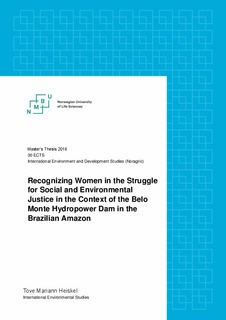| dc.description.abstract | In this thesis, I explain the interlinkages between large dams, women and struggles for social justice within the context of the Belo Monte dam. First, I study how and why women are impacted in different ways by the Belo Monte project, and secondly, I explore how affected women, involved in social movements, react to the effects of the Belo Monte hydropower dam, and what results their struggle has given.
The study is based on a qualitative research methodology. The empirical data derived from semi-structured interviews and analyzed by means of inductive content analysis. The discussion of the results was framed within the three dimensions of social and environmental justice theory (distribution, recognition and participation) and conceptualised in a gender perspective, with a focus on women.
The findings show that people from riverside communities were impoverished by dispossession and maldistribution practises imposed by the construction authorities and also by their collective abandonment of the uprooted people in terms of public services, mitigation- and rehabilitation strategies. These sudden and vast changes affected women severely because of their traditional position as caretakers of the family, linked to their home and community. The forced displacement to inland resettlement-suburbs with lacking public infrastructure and water supply, increased and complicated women´s daily work burdens and ended their incomes from resource-dependent smallholder activities. Existing problems of gender-related violence and sexual abuse increased after the Belo Monte project due to the vast immigration of construction workers and the social confusion the project generated. No adequate measures had been taken to avoid this situation. Being bound to the home and family where the grievances, problems and desolation were most evident, women ended up in the very short end of distributional inequity having to cope and overcome the challenges.
While these impacts are significant, I argue that increased awareness about local women´s lives, losses and claims are important to implement measures to overcome them (Buechler et al. 2015; Dyck 2005), and importantly, to recognize that local women´s interests are different than the ideas powerful decision-makers have for development. To obtain change, it is important to include women´s participation in decision-making arenas in large socio-environmental projects such as the Belo Monte dam, and likewise in the construction of national policies and regulations.
I suggest that by paying attention to women´s lives, voices and actions, one can obtain valuable information about some of the hidden drivers of social and environmental change such as: unjust distribution, misrecognition of difference and exclusion in decision-making processes, which are all obstacles to a move towards equity and justice. In this thesis, I conclude that women´s participation helps building gender-just movements and incorporates women´s claims in political strategies associated with socio-environmental movements; strategies that demand just distribution, recognition and participation in order to confront economic, cultural and political oppression of marginalised groups, with women at the centre. | nb_NO |

